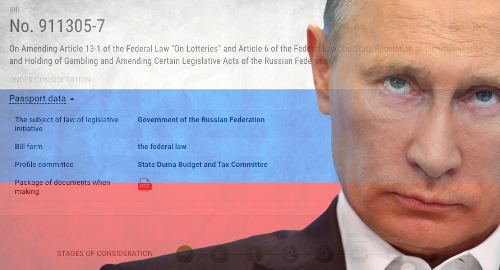 Russia’s online bookmakers could find themselves facing heat from local authorities if they run internationally licensed versions of their locally licensed betting brands.
Russia’s online bookmakers could find themselves facing heat from local authorities if they run internationally licensed versions of their locally licensed betting brands.
On Saturday, Russia’s state Duma registered a new bill seeking to amend the country’s laws on lotteries and gambling to prohibit participation by any individual with an “unexpunged or outstanding criminal record for economic crimes or crimes against state power, or for intentional crimes of moderate gravity, serious crimes, especially serious crimes.”
The bill also stipulates that gambling organizers “cannot be legal entities registered in states or territories that are not providing for the disclosure and provision of information during financial transactions” that are overseen by Russia’s Ministry of Finance.
Russian-licensed gambling operators would be compelled to provide “information on their beneficial owners, individuals and legal entities” who have a “significant direct or indirect (through third parties) influence” on a gambling operator’s decision-making process.
Russia has licensed 19 local online bookmakers but these operators are prohibited from offering online casino or poker products to Russian customers. Many of these operators have established internationally licensed offshoots that cater to not only an international audience but also accept Russian customers who are seeking out such forbidden options.
Russia has fought these efforts by blocking thousands of international gambling domains every month and clamping down on payment processing channels. The loss of its Qiwi payment channel reportedly compelled Russian-licensed Liga Stavok to shut its Curacao-licensed dot-com operations in December.
Those payment processing options are set to narrow further on May 1 when both Skrill and Neteller stop servicing Prepaid Mastercards for Russian customers. Russian customers reported receiving emails from Skrill last Thursday alerting them that their cards would be cancelled as of May 1 but their accounts would remain functional and their balances would be unaffected. Similar messages were sent by Neteller regarding their Net+ prepaid cards.
While the withdrawal of these options may be a response to the European Union’s 5th Anti-Money Laundering Directive taking effect in January, the announcement came just days after Russia’s central bank expanded its criteria for blocking accounts based on suspicious transactions as defined by local anti-money laundering regulations.
The Bank of Russia noted that this was the first time since 2012 that the criteria had been amended, which it said was justified due to “the general digitalization of banking services.”
